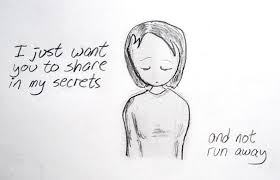There is a saying in addiction treatment that goes, "Secrets keep you sick." I first heard this phrase while working in a substance abuse RTC here in Salt Lake. There was a lot of focus in this program on secrets, letting secrets out, etc. This was such a powerful thing to be introduced to, and something I have carried with me since. I only wish I had been aware of this concept in the work I had done prior to working at this facility.
Over the years, it seems I have developed a somewhat uncanny ability to tell when someone is keeping a secret that is impeding their treatment. For some, I am sure this skill is quite irritating, but for many others, I can see the relief on their faces when I bring up the concept of holding onto secrets. Before going farther, I should probably better define what I mean by a secret.

There's the obvious definition of a secret. Something you hold onto and don't tell anyone else. So, something you did, something that happened to you. And these can be powerful secrets. But, sometimes "emotional secrets" can be even more powerful. What I mean by this term is those emotions we feel, but don't tell anyone about. It's the emotions about events that we cannot escape and that we, for whatever reason, are too scared to tell anyone else about. Sometimes, we have told people the details of an event, so in that way, it is no longer a secret, but if we hold onto emotions about that event, suddenly it is still a secret. It's a hard concept to explain, but for those who you holding secrets, I am sure you know what I mean.
Secrets make people "act twitchy," as I often so clearly describe it. They generally avoid becoming emotionally connected, vulnerable, and when you ask a question, sometimes you can tell there's something not being said. They have emotional reactions to things that you can't quite understand. In many ways, it is hard to describe how to tell someone has a secret, and fortunately, most people don't need this skill. But, when clinicians have the ability to tell a secret is there, they can help the patient eventually feel safe enough to let it out.

When it comes to eating disorders (or substance abuse, or self-harm), secrets will often lead the person to "need" the symptom to cope. This might be a strange concept to those of you who have not experienced one of these behaviors. How could someone "need" the symptom of a disorder? Well, when the emotions linked to a secret are so strong, and you are trying so hard not to let that secret out, the symptom serves as an excellent distraction, a way to avoid, and a way to keep others at arm's length.
So, let's try an example. Let's say Suzie Q has an emotional secret. She feels extreme guilt about something she did a year ago, but that guilt makes it so she doesn't want to tell anyone because who knows what others will think of her. But, as she goes through her days, she thinks of this thing she did, and she feels badly. You can look at her sometimes, and see she seems to be lost in her own head, and she is thinking about that thing she did that she cannot tell you about. Sometimes that guilt becomes overwhelming and she almost cannot stand it, but then she engages in her ED. It doesn't matter the symptom; really, they all serve the same purpose. And as she engages in that symptom, she is distracted from that guilt, and maybe even feels better, because she is punishing herself. The guilt decreases for the moment. The problem is that the guilt always comes back, and it will until she is able to "work through" the guilt. So, the need for the ED symptom remains.

Now, I can't say everyone with an ED has secrets. That would be unfair to draw such a broad stroke. But, if you have secrets that you have not told your treatment team about, maybe start by at least writing the secrets out; this way, you have at least admitted them to you. And, then, as you feel safe (not that it will ever feel TOTALLY safe to tell a secret), tell your team. Let them help you talk through it. And, fortunately, in my experience, once this happens, you will feel better. If it is your loved one that has secrets, I wouldn't try to force the secrets out....that is too scary and will be met with resistance. But, let your loved one know you are there to listen and to support whenever he/she is ready to talk.